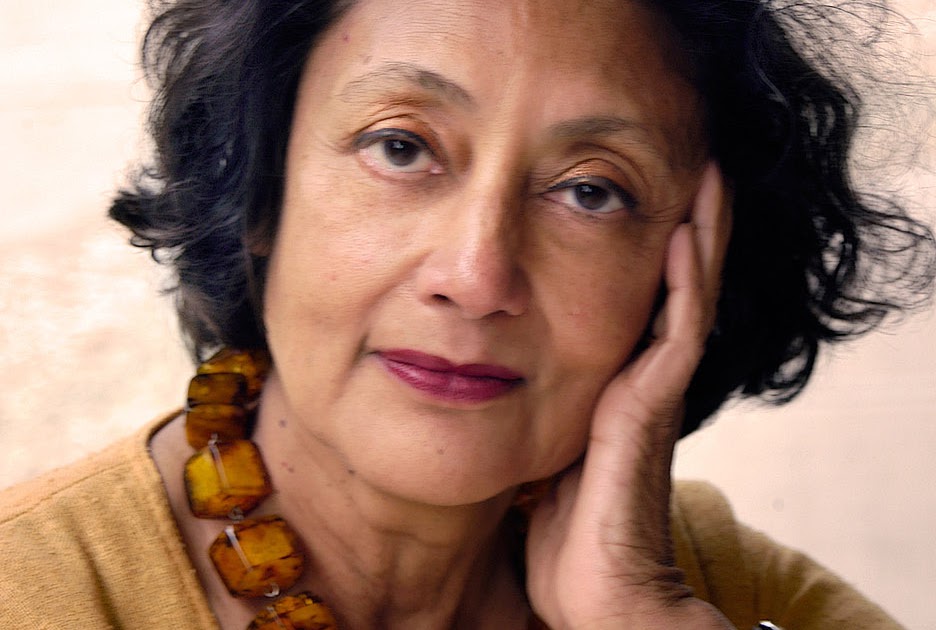
Bharati Mukherjee, author of prominent novels such as Jasmine and The Tiger’s Daughter, died on January 28, 2017. She was 76.
Mukherjee was born in Kolkata, India and graduated from the University of Calcutta in 1959 and a Master’s from the University of Baroda. Mukherjee pursued additional graduate degrees in the United States, receiving a Master’s of Fine Arts from the University of Iowa’s Iowa Writers’ Workshop and a doctorate in Comparative Literature from the same school.
Mukherjee is perhaps best known for her novel, Jasmine, which was published in 1989 and which explores the shifting identities of a young Indian woman as she seeks to find her place while growing up in America. Jasmine received widespread acclaim for its exploration of Asian American female identity — and specifically, Indian American female identity — when the genre of Asian American fiction was still in its infancy. The book also holds personal resonance for its formative role in my own growth as a student of Asian American literature and history, and for its unapologetic centering of a South Asian American female protagonist during a time in American literature when such writing was virtually unheard of.
Mukherjee commented about Jasmine‘s protagonist in a 1989 interview with Bomb Magazine:
I think of Jasmine, and many of my characters, as being people who are pulling themselves out of the very traditional world in which their fate is predetermined, their destiny resigned to the stars. Traditionally, a good person accepts this. But Jasmine says, “I’m going to reposition the stars.
…The story is really the making of an American mind. She’s an individual who makes a lot of mistakes, but who has the courage to choose and take risks. She happens to be uneducated and very young when she comes here as a widow—but she’s full of life. I fell in love with the character when I was writing the story, “Jasmine,” in “The Middle Man”. She stayed with me until I wrote her own novel. Jasmine falls in love with a number of men who change her life, and whose lives she changes substantially; sometimes destroys, inadvertently. It’s a novel of a woman with appetites that she is willing to indulge. She’s a torn angel.
Nonetheless, Mukherjee rejected the hyphenated label of “Asian-American”, preferring to classify herself as an American — not an Asian American — writer; she further refused to see herself as an Indian writer. In explaining this stance, Mukherjee said she found the label limiting — complaining that it presumed she should only write about South Asian identity and narratives, and that these immigrant stories were not truly American. Instead, Mukherjee felt that to be truly American meant that she should be free to define herself however she wanted to as a writer.
Commenting on this, Mukherjee said in 1989:
I totally consider myself an American writer, and that has been my big battle: to get to realize that my roots as a writer are no longer, if they ever were, among Indian writers, but that I am writing about the territory about the feelings, of a new kind of pioneer here in America. I’m the first among Asian immigrants to be making this distinction between immigrant writing and expatriate writing. Most Indian writers prior to this, have still thought of themselves as Indians, and their literary inspiration, has come from India. India has been the source, and home. Whereas I’m saying, those are wonderful roots, but now my roots are here and my emotions are here in North America.
Mukherjee is also known for her 1977 memoir, Days and Nights in Calcutta, which she co-wrote with her husband, Canadian writer Clark Blaise. Days and Nights in Calcutta explores Indian from the dual perspectives of Blaise (as a Westerner) and Mukherjee (as an expatriate).
In addition to her published writing, Mukherjee also taught English at several Canadian and American universities, and was most recently Professor Emeritus of English at UC Berkeley. In announcing her passing yesterday, the trustees of the Taraknath Das Foundation called Mukherjee “a wonderfully talented American writer of South Asian descent, teacher, friend, generous spirit.”

